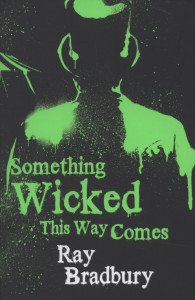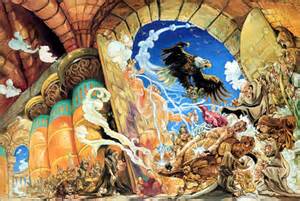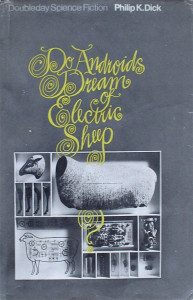Keep Your Wives and Swap Your Books
 Horror
Horror
Rebecca Myers prepares to be terrified as she reads Bradbury’s Something Wicked This Way comes
[dropcap]N[/dropcap] o matter how many years of reading you have behind you, and how ‘open-minded’ you consider your liberal literary taste, there comes a moment when someone recommends a genre to you that you’ve probably never heard of. Now was my time.
Eagerly engaging in the genre swap, I wondered: what could someone throw at me that I hadn’t even dipped my well-read tootsies into before?! – I hit a bit of a wall. ‘Horror’ I drew, and ‘horror’ I had never, never read before. What did horror entail? Was it like The Woman in Black – I was absolutely praying not, because when I saw The Woman in Black I had a fever and slept walked for about three nights afterwards. Which brings me to another point: I, Rebecca Myers, am a scaredy-cat. So what would I do if the book made me sleep with the lights on for the rest of the academic year?
When I received the book, I must say I was less than impressed. Book reviews can’t all be good, and I was starting to worry mine really wouldn’t be. A neon green design, with the silhouette of a man in a tophat, and a spattered effect – it looked like a children’s book from the outside. The reality was no book for children, except perhaps the ‘inner child’, if you can so call the inner devourer of new words and mesmerising imagery. Words like ‘itchweed’ and phrases like ‘somewhere in him, a shadow turned mournfully over’; images of a young, pale boy called Jim Nightshade, a duo called Mr Cooger and Mr Dark, and a world in which there is such thing as a lightning rod salesman.
If you want to reawaken tingling nerves and spell-bound vocabulary that conjures forgotten worlds of slime and shadows and cold winters, delve into the world of Something Wicked This Way Comes. People often look for a novel to refresh their reading list, to give them a change of literary scene. Few novels and few genres will be able to do this for me ever again after the imaginative overhaul I embarked on with this dark volume. As for the rest of the genre, who knows? I can say only this: I have been spoiled by being given the true horror to end all horrors, the ‘timeless rite-of-passage’ of the master Ray Bradbury.
[divider]
Non-Fiction
Andy King tackles literary criticism and Hanif Kureishi’s thoughts on multi-culturalism
“Being a child at all involves resolving, or synthesising, at least two different worlds, outlooks and positions.”
[dropcap]H[/dropcap] anif Kureishi’s The Word and the Bomb might be described as an evolving opinion on race relations and multiculturalism in Britain. The child of a Pakistani Muslim father and a white British mother, Kureshi describes his parents’ outlooks ‘clash[ing]’ within him, causing him to not really side with either. With this position, he scrutinises both cultures and their interactions with one another. The text contains extracts of the author’s work, including the entirety of My Son the Fanatic and a chronological list of essays.
Kureishi’s non-fiction reads as eloquently as his prose without losing any clarity of meaning. At under a hundred pages, it can easily be read in an afternoon. However, whilst his words are well-spoken, I’m unsure they had a lasting effect on me; the sermon-like statements about my “human duty” not to be blinded by religion felt, to me, like he was preaching to the choir (if you’ll pardon the pun). That isn’t to say the book isn’t enjoyable, just that I felt it was targeted at a demographic I don’t belong to.
[pullquote style=”left” quote=”dark”]Kureishi’s non-fiction reads as eloquently as his prose without losing any clarity of meaning[/pullquote] This is possibly the first non-fiction book I’ve read cover to cover. I’m usually very fiction, if not fantasy, focused: stories fascinate me and I doubted non-fiction’s ability to provide a satisfying narrative arc. Kureishi proved me wrong to an extent. His voice is rich and his evolving argument about the need for multiculturalism provides an arc-of-sorts. I would not say that I am a converted non-fiction reader, yet I enjoyed the prosaic segments (such as My Son the Fanatic) more than the essayistic chapters. Whilst my preconceptions weren’t entirely accurate, I haven’t been convinced of the worth of opinion over those truths that can be gleamed from fiction.
[divider]
Fantasy
 Phoebe Demeger muses on the king of fantasy Terry Pratchett and his novel Small Gods
Phoebe Demeger muses on the king of fantasy Terry Pratchett and his novel Small Gods
[dropcap]I[/dropcap] t’s not that fantasy and I don’t get along, per se; we’ve just never had an especially strong relationship. For example, despite enjoying The Lord of the Rings film trilogy as much as the next person, I’ve never felt any need to delve fully into the world of Tolkien, or more recently George R. R. Martin.
Thankfully, Pratchett in his Discworld series (Small Gods being the thirteenth instalment) creates a well-realised alternate universe while keeping heavy-handed description to a minimum. His laconic and witty prose leaves you no choice but to suspend disbelief and immediately invest yourself in the fate of a once-powerful God trapped within the unlikely form of a sassy tortoise. It’s refreshing to see a genre novel not taking itself too seriously; or more accurately, an author who doesn’t take his genre too seriously.
Yet that’s not to say that the novel is solely a light-hearted romp. It also serves as a caustic warning of the dangers of institutionalised religion, and what happens when that religion becomes too powerful. Moreover, through the journey taken by the underdog hero Brutha, it poses the underlying question: is it better to trust and believe in gods, other people, or oneself?
To sum up: a philosophical and witty book, with just enough fantastical elements to entice you into the next instalment. Thanks to Pratchett, I’m feeling ready to take on the Discworld, and maybe even Middle Earth someday.
[divider]
Classics
Rhianne Poole took on Oscar Wilde and the genre of the Classics
[dropcap]W[/dropcap] hen I received Oscar Wilde’s The Picture of Dorian Gray, I couldn’t wait to lap up the corruption, debauchery and excess of Wilde’s only published novel. Reason one: I’m a big fan of the fin-de-siècle, Victorians, and all things decadent. Reason two: it’s on the reading list for one of my modules next year.
What makes the novel a great classic to me is that despite its surface contextual significance, Wilde deals with a more universal issue: what effect does sin have on man’s soul?[pullquote style=”right” quote=”dark”]What effect does sin have on a man’s soul?[/pullquote]
Dorian Gray’s portrait begins to bear (and bare) all of his sins. Indulgence in unspeakable desires transforms only his picture, leaving his corporeal beauty and youth unmarred. The novel documents Dorian’s adult life, from the initiation of his corruption by Lord Henry Wotton, to the shocking consequences of sustaining such a immoral double life, denying his senses nothing whilst remaining a “gentleman” in polite society. It was certainly an engrossing, if not quick, read. The plot drives the narrative down to its expected dénouement, whilst the unspoken activities of Mr Gray shroud the life of its protagonist in a veil as dense as the opium smoke which clouds his senses.
However, having not read many of Wilde’s works, I was quickly challenged by his characteristically embellished style, and to me it became quite tiresome. The prose is littered with theatrical cynicism, lavishly tripping from the golden tongue of the corruptive influence of Lord Henry Wotton. “You cut life to pieces with your epigrams”, an insult of Dorian’s, confirms my reading experience of the annoying excess of such phrases.
Although the style is a bit tough going, the plot and ‘moral of the story’ ascends the difficulty. I’d definitely recommend Dorian Gray to anyone looking for a read which raises that general problem of morality, and what happens when you’ve gone too far over to the dark side…
[divider]
Science-Fiction
 Una Shah delves into the wonderfully weird mind of Philip K Dick
Una Shah delves into the wonderfully weird mind of Philip K Dick
[dropcap]I[/dropcap] ’d tried reading a bit of science fiction before taking part in this project – a little time travel here, some dystopia there. However, I’d never read anything like Philip K. Dick’s Do Androids Dream of Electric Sheep? Set in a post-apocalyptic Earth ravished by nuclear war, Rick Deckard is a bounty hunter hired to ‘retire’ six runaway androids in order to own the greatest status symbol: a living animal.
As the title suggests, Dick’s novel contains pretty much every sci-fi cliché out there, and by the time I’d finished Chapter One I was already bored of reading long descriptions about synthetic mood organs, World War Terminus, and electric animals. However, as the story got going I found myself enjoying it more and more. Although my attention did slip at times, I was always inclined to keep reading – the plot was gripping and easy to follow, the action was fast-paced, and the character interaction was well written and interesting.
One of the common preconceptions about science fiction is that it’s mindless – you know, like aliens coming down to Earth and blowing everyone up, that sort of thing. But I was pleasantly surprised to find that Do Androids Dream of Electric Sheep? was actually a very thought-provoking read. The novel explores a number of questions that are relevant to today’s society: what it means to be human, the distinction between man and machine, and the issue of social manipulation. In terms of both entertainment value and intelligent writing, Dick definitely exceeded my expectations.
I’m usually a bit of a snob when it comes to literature. My genre of choice was ‘classics’, but despite my snobbery, I actually preferred Philip K. Dick’s modern sci-fi to many of the books considered essential to the literary canon.
OK, it wasn’t the best book I’ve ever read, and I don’t think science fiction is ever going to become my genre of choice. But despite my initial presumptions, I enjoyed Do Androids Dream of Electric Sheep? a lot more than I thought I would. It just goes to show, literature can appeal to everyone, no matter which genre you prefer, and it’s always worth trying something new every once in a while.
[divider]
Crime
Scott Evans delves into the murky world of crime with William Boyd
[dropcap]W[/dropcap] hen first asked to participate in this experiment I was, at first, sceptical. I knew nothing about the crime genre outside of the near mythologized Sherlock Holmes stories, and am loathe to be separated from my beloved science and horror books. So armed with nothing but a brief scan of relevant Wikipedia articles, I took my first steps into the world of Crime fiction with William Boyd’s Ordinary Thunderstorms.
The plot is well implemented and peppered with well-written prose throughout, however it peters out somewhat in the latter quarter and is not without loose ends. While the thrills were a little few a far between for me (though this may simply be due to my Horror addled senses) the narrative is well paced leaping between varying perspectives which are skilfully weaved and separated throughout the novel. The subtle changes in the language used by each of the characters are a nice touch and further highlight the differing viewpoint of each protagonist. The background knowledge demonstrated by Boyd regarding pharmaceutical industry and meteorology is well researched, though admittedly glamourized, and creates a not-unbelievable reflection of the cutthroat business practices of drug companies.
[divider]

Try the book-swap challenge! @BoarBooks #BooksSwapChallenge
Comments